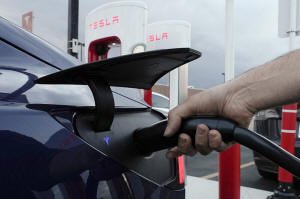US electric vehicle industry is collateral damage in Trump's escalating
trade war
[April 05, 2025] By
ALEXA ST. JOHN
DETROIT (AP) — President Donald Trump's tariff blitz has sent shock
waves throughout every aspect of the global economy, including the auto
sector, where multi-billion-dollar plans to electrify in the United
States are especially at risk.
Here's what consumers should know about the impact of tariffs on
electric vehicles.
Where does EV adoption stand in the U.S.?
EVs accounted for about 8% of new car sales in the U.S. in 2024,
according to Motorintelligence.com.
Some of those sales can be attributed to expanded tax credits for EV
purchases, a Biden-era policy that spurred car buyer interest.
Tesla held a majority of U.S. EV market share in 2024, at 48%. But that
share has declined in recent years, as brands including Ford (7.5%),
Chevrolet (5.2%) and Hyundai (4.7%) began to offer a wider variety of
electric models at better price points, according to Kelley Blue Book.
Electric vehicles remain more expensive than their gasoline-powered
equivalents. New gas vehicles sold for $48,039 on average last month,
Kelly Blue Book data says, while EVs sold for $55,273 on average.
Tariffs add on to the costs of an EV transition that was already
volatile and uncertain, said Vanessa Miller, a litigation partner
focused on automotive manufacturing at law firm Foley & Lardner.
What makes U.S. EV manufacturing so challenging?
Biden’s tax credits essentially required automakers to get more and more
of their EV content from the U.S. or trade allies over the coming years
in order for their vehicles to qualify. Automakers have worked to build
an EV supply chain across the country and significant investment has
gone toward these efforts.
EVs assembled here include Tesla models, the Ford F-150 Lightning and
more. Tesla actually might be least vulnerable given how much of its
vehicles come from the U.S.
Though the industry is growing, tariffs mean costs for automakers and
their buyers will stay high and might go higher, as well as hike up the
prices of the many parts of EVs still coming from China and elsewhere.
From the critical minerals used in battery production to the vehicles
themselves, China laps the U.S. industry.

Automakers were already pulling back on ambitious electrification plans
amid shrinking federal support and are strapped for cash on what is the
less lucrative side of their businesses.
What do the tariffs mean for EV pricing and inventory?
Higher prices might push car buyers to the used car market, but they
aren't likely to find much respite there.
[to top of second column] |

A motorist charges his electric vehicle at a Tesla Supercharger
station in Detroit, Nov. 16, 2022. (AP Photo/Paul Sancya, File)
 If consumers don't buy as many
vehicles, automakers will have to prioritize their investments and
manufacturing. That means the cars that buyers want and that are
most profitable. Automakers still lose thousands of dollars on each
EV they make and sell, but they make money from big, popular
gas-guzzling pickup trucks and SUVs.
These manufacturers “have put a certain amount of investment into
EVs, and it would probably be even more wasteful to completely walk
away from them than it is to find the new level at which it makes
sense to maintain production of them," said Karl Brauer, executive
analyst at auto research site iSeeCars.com. That level “will
assuredly be lower than what it was,” he added.
Making fewer EVs won’t help bring their cost down further anytime
soon.
Albert Gore, executive director of the Zero Emission Transportation
Association, said in a statement the EV and battery sector is
working to ensure that the American auto industry grows and that his
group will work with the administration on productive trade policy.
“Tariffs on our longstanding trade partners, many of whom have
committed billions in direct investment into U.S. factories,
introduces uncertainty and risk into an industry that is creating
jobs and bringing new economic opportunities to communities across
the country,” Gore said.
How else have Trump's policies stifled U.S. EV growth?
Trump has already taken a hatchet to federal EV policy. He
campaigned on a vow to end what he called former President Joe
Biden’s “EV mandate.”
Biden’s EV policies did not require automakers to sell EVs or
consumers to buy them, but they did incentivize manufacturers to
increase their electric offerings in the coming years. Trump put an
end to Biden’s target for 50% of all new vehicles sold in the U.S.
to be electric by 2035 in his first days in office.
Also under Biden, Environmental Protection Agency and National
Highway Traffic Safety Administration rules on vehicle greenhouse
gas emissions and fuel economy were to get increasingly tougher, but
could be met by automakers selling a growing number of EVs alongside
more fuel-efficient gasoline-powered vehicles. Trump's
administrators are already reevaluating emissions standards.
He's also likely to seek to repeal the tax credits.
All contents © copyright 2025 Associated Press. All rights reserved |